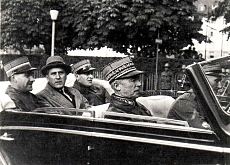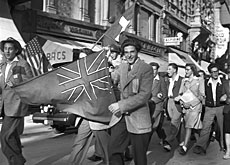A spy book that shadows Switzerland’s past

As books about spying go, Secret Channel to Berlin by Swiss historian and former diplomat Pierre Th. Braunschweig has one big advantage.
His story is not fiction, but a real account of intelligence activities in Switzerland during the Second World War.
In particular, it focuses on the most controversial of Swiss intelligence operations during that time – the connection between the head of Swiss Intelligence, Colonel-Brigadier Roger Masson, and the head of German SS Foreign Intelligence, General Walter Schellenberg.
Masson, who can be credited with building up his service from scratch, was in 1941 concerned about Switzerland’s “troubled relations with its superior, unpredictable” neighbour to the north, after Germany had accused it of a lack of neutrality.
And there was a risk that Germany might also launch a preventive attack because it did not trust Switzerland.
Braunschweig spent seven years researching the book. He sifted through hundreds of thousands of documents in European and United States archives and interviewed participants and witnesses.
The result is a deftly woven tale of how Masson came into contact with his German opposite number, Schellenberg.
Risk
Masson took no small risk in crossing the border into Germany for his first meeting with Schellenberg in September 1942, mainly to tell him that Switzerland was determined to defend itself against any aggressor.
The book reveals that Masson’s secret channel to Berlin did not play such a decisive role as he believed.
“If you asked Masson, he believed to the end of his life that it was central,” Braunschweig told swissinfo.
“If you talked to the opponents of this connection – a group to which most senior intelligence officers belonged – they would say it was not at all that important and [that it] was unnecessarily risky to maintain such a contact,” he added.
What Masson did achieve from Schellenberg was the release of a number of Swiss from concentration camps. But Braunschweig believes that it is doubtful Masson achieved his main goal of convincing the Germans that Switzerland wanted to remain neutral.
“I think I’ve proved in my book that this didn’t work out as Masson had hoped because the person he chose for communicating this belief – Schellenberg – did not have the access to Hitler that he claimed,” Braunschweig said.
“Secret” meeting
Another fascinating thread in the book revolves around a “secret” meeting that Masson, Schellenberg and the commander in chief of the Swiss armed forces, General Henri Guisan, had in the Bären inn in the Bernese village of Biglen in March 1943.
“From the point of view of spy tradecraft that was a little bit strange because Guisan didn’t want to make it [the meeting] known.
“It was not the most logical idea to choose the inn at Biglen because you always ran the risk that someone would know you, especially if you were General Guisan,” Braunschweig said.
The author also points out that one harmless event at the meeting was to have far-reaching consequences.
The manager of the Bären asked the participants to sign the guest book. But the last person to sign his name, a Swiss criminologist, realised that the book could prove to be a compromising document because the Swiss General had signed it together with a high-ranking SS-General.
When the guests said goodbye to each other, he cut out the page with his pocket knife and hid it in his jacket. Later, when the manager wanted to see whom the general had been dining with, he noticed that the page was missing.
To cut a long story short, inquiries were made, passed up higher and higher until the issue was brought up at government level, with Guisan eventually being given a reprimand.
Exhaustive study
Braunschweig’s story will keep anyone interested in intelligence gathering well entertained because it is an exhaustive study, shedding light on the patriotism of the people involved.
After the war, they were not considered heroes, he writes, although they had been willing to run personal risks.
“It’s comforting to put the record straight and show not only what they did wrong – that’s easy in hindsight – but also how it really was for the people at that time,” Braunschweig said.
“They had no idea that World War Two would end on May 8, 1945… in early 1945 you could be fairly confident that in the end the Third Reich would lose the war, but there was no guarantee whatsoever that Switzerland would not be somehow still drawn into the struggle,” he added.
It is all seems a far cry from the modern world of espionage, depicted as adventurous to the extreme – such as in the James Bond films.
But Braunschweig is convinced that even today, intelligence gathering entails “boring, stubborn work assembling information, putting one little piece in the puzzle and afterwards trying to figure out what it all means”.
“There’s a lot of inglorious hard work behind the scenes so we shouldn’t imagine that everyone has a pistol and poison in his pocket,” he added.
swissinfo, Robert Brookes
During the Second World War, Swiss Army Intelligence lost 48 agents who were verified as killed in the line of duty:
31 were sentenced to death and executed.
11 died in prison.
Six died as a result of accidents.
Seven of the 48 agents were Swiss.
After the war in September 1945 Masson gave an interview to the London-based Exchange news agency which caused a storm of indignation in the Swiss press.
Masson said that the Germans had intended to attack Switzerland in March 1943 and annex it after finishing their campaign.
He added that the plan was abandoned after General Schellenberg convinced Hitler that Switzerland was more useful as a neutral country than as an occupied one because it would better cover Germany’s southern flank.
The government described Masson’s action as “tactless to say the least”.
Masson was rehabilitated after an administrative inquiry but resigned from his position as chief of Swiss Intelligence.

In compliance with the JTI standards
More: SWI swissinfo.ch certified by the Journalism Trust Initiative










You can find an overview of ongoing debates with our journalists here . Please join us!
If you want to start a conversation about a topic raised in this article or want to report factual errors, email us at english@swissinfo.ch.